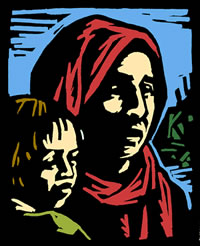
28th Sunday in Ordinary Time Year A
The parable, about the king who welcomed to his son’s wedding all who could be found, when those who had been invited refused to come, has a message similar to that of the parable we heard last week (which it immediately follows in Matthew’s gospel). Old Israel has not responded to God’s call, and now a New Israel will include all peoples, giving expression to God’s inclusive ways as it carries forward the designs of God. Again, we can recognise that the original parable of Jesus has been modified, as it was retold by the Church’s early preachers. Comparing Matthew’s presentation with Luke’s account of the same parable (Lk14: 15-24) makes it possible to recognise the additions Matthew has made. Luke’s much simpler presentation is no doubt closer to the parable as Jesus told it. Matthew’s presentation is embroidered with additions that give us a valuable insight into the themes that gave expression to the faith life of that early Christian community – themes that can help enrich our faith.
In Luke’s account, Jesus responds to the remark of someone at table with him (‘Happy those who will share the meal in the kingdom of God’) beginning his parable, ‘There was a man who gave a great banquet’. Matthew takes up and develops the theme of joy and celebration essential to Christian faith implied in this beginning, and opens the parable, ‘The kingdom of heaven may be compared to a king who gave a feast for his son’s wedding’. The espousal theme was fundamental to the biblical tradition. The prophets compared God’s relationship with the chosen people with that of a loving and faithful husband. For the first Christians, the Saviour was ‘the Bridegroom’ (Mk 2:20), and the life they shared in the Church was described as joining in ‘the wedding feast of the Lamb’ (Rev 19:9). A banquet - especially that which celebrates a wedding - is an outstanding moment of fellowship. In the traditions of Israel, familiar to Matthew’s community, the blessings promised by God to those who have been faithful were likened to sharing in a banquet at the Lord’s table – as we hear in the reading from Isaiah in today’s liturgy. As they heard this reading, and rejoiced in its fulfilment in Christ, this community would have given thanks for the universality of God’s generous designs: ‘all peoples and nations’ will share in God’s blessings ‘everywhere on earth’, the prophet declares. Already, they knew, the faith was beginning to spread. Long familiar with the biblical themes, they would have seen the prophet’s associating of the messianic blessings with, ‘this mountain’ as a reference to the old temple. But if, as is likely, the old temple had already been destroyed by the Romans (A.D.70) when Matthew’s gospel was written, they would have been reminded that the shared life of Old Testament faith was only a foreshadowing of the eternal realities brought by Christ.
Matthew’s account includes the note of urgency characteristic of the outlook of the first Christians – three times, the king declares that all is ‘ready’. The final age has come, all must be ready to respond to the Lord’s call. And so, along the same lines, Matthew concludes his presentation by adding the short parable about ‘the man without a wedding garment’ – that would originally have been quite independent of the original story. Again the lesson is clear: although, in the present age, Matthew’s Church receives ‘the good and bad alike’ to rejoice at the wedding feast of the Lamb, let them know that their presence must be more than nominal adherence – they must be converted and live a life worthy of their calling.
John Thornhill sm

